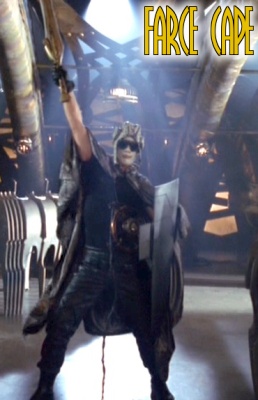
A caption I always wanted to write. From “Crackers Don’t Matter,” one of Farscape’s more comedic episodes.

A caption I always wanted to write. From “Crackers Don’t Matter,” one of Farscape’s more comedic episodes.
A while back I remarked that the Babylon 5 spinoff Crusade died in part because the Sci-Fi channel had already committed to Farscape.
I was thinking about VR.5 recently. Had it survived into a second or third season, Anthony Stewart Head might not have been available for Buffy the Vampire Slayer. Can you imagine anyone else as Giles? Of course, given the nature of the show (they killed off a regular about five episodes in, and pulled an “everything you know is wrong” moment near the end of the season), it’s entirely possible that Oliver wouldn’t have made it through season 2 anyway, and he still would have gotten the role as Giles.
![[Cover]](https://hyperborea.org/journal/wp-content/uploads/2005/03/neverwhere11.jpg) Also in comics news, the nine-part adaptation of Neil Gaiman’s Neverwhere begins in June.
Also in comics news, the nine-part adaptation of Neil Gaiman’s Neverwhere begins in June.
The basic premise is this: In urban areas, we tend to tune out the homeless to the point where we don’t even see them. What if we really don’t see them? What if there’s another world, just slightly out of sync with this one, where the rules are all different. (JMS used a similar springboard for Midnight Nation, but took it in a completely different direction.) There’s poverty, and scavenging… but there’s also magic, and honor, and a society with its own strange codes. The story follows everyman Richard Mayhew as, through a simple act of kindness, he slips through the cracks from London Above to London Below. In order to get back, he has to help a mysterious girl named Door on her quest to find her family’s killers and honor their legacy…and escape the assassins tracking them both!
It’s hard to guess how well this will work. Neil Gaiman’s comics and prose are both fantastic (in every sense of the word). Comic book adaptations of his prose, though, haven’t been nearly as good. The writers have a tendency to preserve too much of the text, and it gets bogged down in narration. It happened with “Murder Mysteries,” with “Only the End of the World Again”, and with “The Price.”
Neverwhere has two advantages, though. It started life as a TV script (he only wrote the novel because he realized that budget limitations and producer interference would prevent them from doing the story “right”), and TV, like comics, is a visual medium. And with nine issues, there should be plenty of room to show, not tell, the story.
Fallen Angel is ending with #20, and Babylon 5: The Memory of Shadows has fallen through.
However, JMS has always said, “If they can do a Brady Bunch movie, you can be sure that sooner or later, somebody’s going to do a B5 movie.” Even better, it turns out that while Warner Bros. owns the B5 TV show lock, stock and barrel, JMS owns the movie rights…so he’s in a position to make sure that whoever does do a B5 movie will get it right. “To that end,” he says… “I can wait.”
As for Fallen Angel, I suspect the timing of the decision means DC either wasn’t waiting for sales after all, or was going on pre-orders from stores. Peter David cryptically remarks, “We are not, however, quite dead yet.” It’s not clear what he means, but the characters are creator-owned, and the series isn’t tied to the DC Universe, so it’s entirely possible for them to pop up again at another publisher. Only time will tell.
I read the TV Guide poll on “What’s really happening on Lost?” a while ago and even then was sorely disappointed with their answers. It was obvious that the survey staff had chosen the responses themselves and then had participants choose, because people in the fandom have come up with much better explanations than “they’re all dead.”
So today, while looking for translations of the Korean parts of the script, I happened upon a bunch of message boards with posts containing riffs on the “Shore Leave” theory. And they got me thinking about not just polar bears, but also a lot of other things that don’t fit on the island. As I see it, the things we need to explain are: the survival of the castaways, the existence of Ethan and Company, the locked door, the power source, what made the French expedition crazy and/or dead, and the monster (which I call the Beastie). Here we go, and comment me if I don’t make sense….. Continue reading
 First of all, Lost has a really annoying tendency to place huge cliffhangers right before the series goes into reruns.
First of all, Lost has a really annoying tendency to place huge cliffhangers right before the series goes into reruns.
Okay, that out of the way, I have some interesting thoughts about Walt, and the possible significance of his comic book. Spoilers follow: Continue reading
As a linguist, I’m highly disappointed in the castaways of “Lost.” In the time they’ve been on the island, not one of them has truly attempted to either 1) learn a few words of Korean or 2) see if Sun or Jin is open to being taught a few words of English. Instead, in painfully true-to-life (but rapidly aging) fashion, they’re relying on the highly effective (*snort*) method of talking really loudly and slowly. Mostly we see this with the English speakers, but last episode it was great to see Jin doing it right back in Korean.
What really disappointed me was that, from what I’ve seen, last week’s episode should have included less crosstalking comedy and more communication, simply due to Jin’s counterpart being Hurley. He’s not a linguist as far as we know, but he is the Guy Who Gets Things Done ™. He has a hefty dose of common sense and “aha” ability, and the wherewithal to act on what he perceives. If any of the major characters were to try to compile some sort of papyrus dictionary, it would be him. And considering that the need to communicate with the Koreans has actually been articulated, unlike the need to take a census or build a golf course, if this weren’t TV, by now he’d probably have either been doing it or found someone else to. Admittedly, though, if he had, we may not have gotten to see that, on the island, the Talk Really Loud method of intercultural communication is universal. Which is comforting, in an odd way: we may not understand each other, but there’s at least something in our communication mechanisms that’s the same.